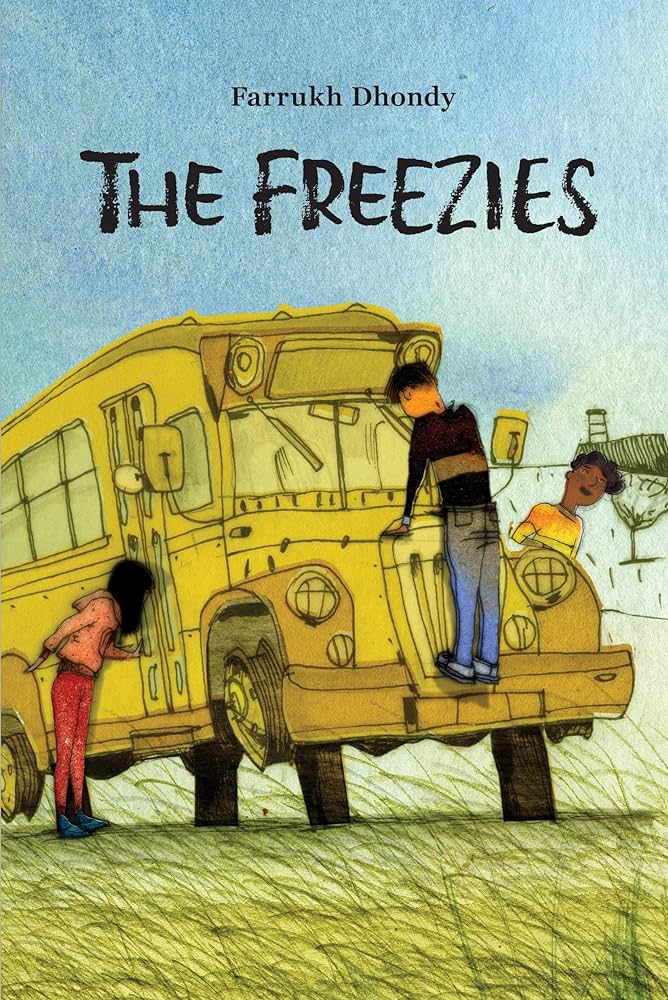The Freezies

The Freezies
Sully’s actually Suleikha – one of us three Freezies. The other is Leonard, known as Leo. I can’t shorten my name, Kai. I guess I could be called “K,” but that could get me mistaken for a girl.
I’m going to tell you who we all are, but let me start by telling you what I saw that day while I was walking to school. As I do every morning, I crossed the common we call The Mead, a big grassy patch on the lower slope of the hill, with all our houses behind it. A path runs round it like the seam on a tennis ball. You start at one place and then go across in a kind of 8 and come back to the same spot. In early March, when it rains and rains, the path gets muddy. What I saw there that morning wasn’t there before. It was a battered old van with a trailer attached that had driven off the road and parked in the middle of The Mead. Cars aren’t allowed on The Mead. So what was this rattletrap doing there? As I passed it, I heard some music. I peeked in a trailer window and saw a man playing a violin. Weird. I was late for school, so I didn’t hang around. (Pp. 7-8)
The Freezies are a group of three friends, Kai, Sully, and Leo. After being bullied by a group of their fellow classmates called the Hotshots, Kai was “frozen” out of that group. As a result, Kai, Sully, and Leo named their group “The Freezies”, rejecting the bullying and peer pressure they were experiencing.
When a strange van appears on The Mead, The Freezies are intrigued. They befriend the violin-playing occupant of the van, Mr. Christaki. The newspaper editor of the Salton Weekly leads a group of local residents campaigning to evict Mr. Christaki from The Mead because they see him as a menace to society. Leo’s parents, who are involved in the legal community, invite Mr. Christaki to park his van on their property.
Mr. Christaki soon becomes an integral part of the community. He is very handy and does repairs for the locals as well as giving violin lessons. Miss Callista Barr, a recluse who is mocked by locals as a witch, owns a dilapidated old home nearby. She suggests that Mr. Christaki help her repair it in exchange for living in the house rent free. He agrees that he is a born “fixer”. Once he has renovated Water Meadow House, the home becomes a community hub with students taking music lessons and locals having various things repaired. He also gets involved with the school drama production of Romeo and Juliet. However, after taking a trip to London, Christaki returns with a four-year-old girl named Miriam. Questions are being asked about where she came from and her relationship to Christaki. One day, the pair disappear, and no one knows where they went or why they left so suddenly. The Freezies are determined to solve this mystery.
The story is told by all three of the main characters in a rotating narrative perspective. “Kai’s dad, Gordon, who writes things in the newspapers, writes books with his name on the covers and is quite famous, told us to write down everything that happened, and tell it like a story.” (p. 12) Not only does this approach give readers insight into their characters, but it also quickly moves the story forward. The number of minor characters and unusual plot twists might be confusing at first, but readers will soon adapt.
This novel is a rich tapestry of diversity. The Freezies are a wonderful mixture of backgrounds: Jamaican, Polish, Indian, and British. Leo’s nanny is from Croatia, and Mr. Christaki is from Syria. All these characters have their own struggles, but all are a vital part of their community. However, not all community members are open to this diversity. The group which seeks to get rid of Mr. Christaki, led by Mr. Hamilton, the editor of the local newspaper, is starkly opposed to him because he is a “squatter”.
Farrukh Dhondy has written an interesting novel with a unique perspective on important topics such as: refugees, immigration, asylum, prejudice, stereotyping, community, drug use, friendship, loneliness, unemployment, poverty, unions, social justice, and compassion. There are also several allusions to literary works such as Romeo and Juliet and A Tale of Two Cities. Despite the xenophobia of some members of the community, Mr. Christaki has a very positive outlook on life which will resonate with readers: “One place you can’t find happiness is at the end of a rainbow…And you can look forever and ever and ever, but the real happiness is the people already around you.” (p. 61)
Myra Junyk, who lives in Toronto, Ontario, is a literacy advocate and author.
